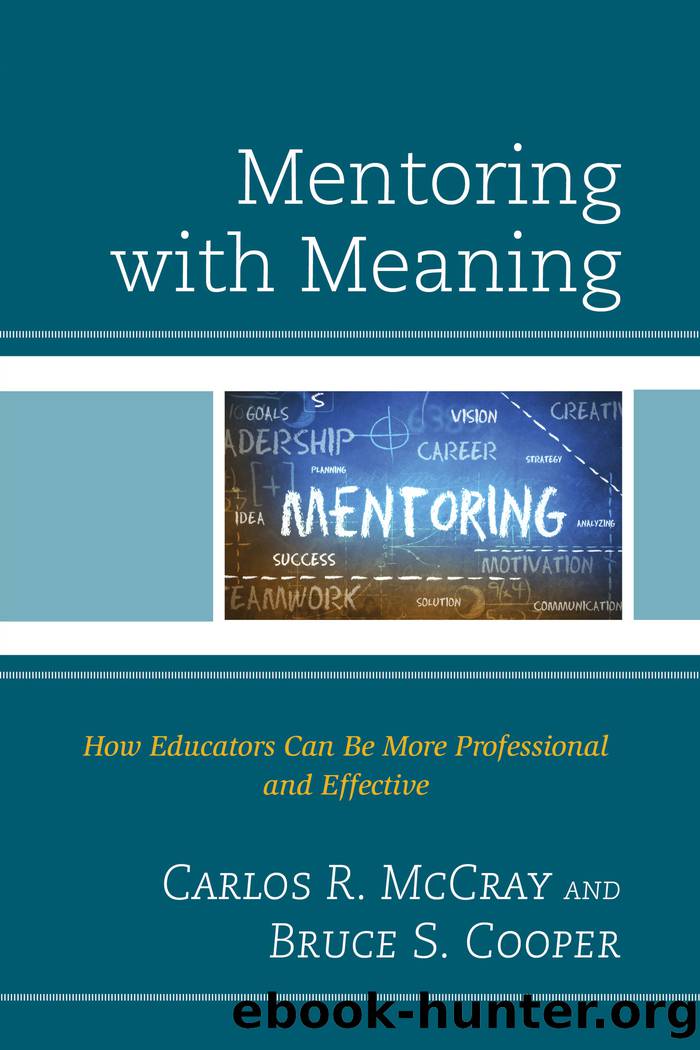Mentoring with Meaning by McCray Carlos R.;Cooper Bruce S. ;

Author:McCray, Carlos R.;Cooper, Bruce S.,;
Language: eng
Format: epub
Tags: undefined
Publisher: Rowman & Littlefield Publishers
Published: 2012-08-15T00:00:00+00:00
Elements of Collaborative Cultures
As Fullan (2008) states, âCollaborative cultures generate greater student learningâ (p. 8). According to Deal and Peterson (2009), âSuccess flourished in schools with a primary focus on student learning, a commitment to high expectations, and social support for innovation, dialogue, and a search for new ideasâ (p. 10). Positive school cultures emphasize the idea of the school as a learning community, not just for the students, but also for the leadership, teachers, and support staff. Hence, teachers become creative problem solvers as they utilize student data to engage in a continuous cycle of inquiry, reflecting and improving their practice according to the needs of their students.
However, teacher collaboration alone does not guarantee better outcomes. Little (2006) describes âprofessional communityâ as it ârefers to close relationships among teachers as professional colleagues, usually with the implication that these relationships are oriented toward teacher learning and professional developmentâ (p. 15). Little (2006) discovered that schools with ânorms of collegiality and experimentationâ adapted to change better and showed higher levels of student achievement than in schools that did not possess these attributes (p. 15). In addition, Little notes that in schools where norms of collegiality and experimentation existed, that teachers were found to be âtalking frequently about their teaching and how to improve it, . . . observed each other, . . . spoke in focused ways about classroom practice, . . . developed and shared materials, . . . were open to giving and receiving advice, . . . and participated in professional development, helping one another learn new ways of teachingâ (p. 16).
McLaughlin and Talbert (2001) found that teachers in collaborative cultures take âcollective responsibility for all student learningâ (p. 139). In these cultures, where âprofessional interdependence, experimentation, and reflection . . . were the norms . . . student success is explicitly everyoneâs responsibilityâ (pp. 51â52). Moreover, teachers in collaborative communities placed their students âat the centerâ and âadapt their practices to accommodate students,â embracing the assumption that it was their responsibility that all students learned (p. 56). As teacher collaboration situated within professional community became the focus of more research, the following common elements emerged:
Element 1: Common/shared mission, vision, values, and goals
Download
This site does not store any files on its server. We only index and link to content provided by other sites. Please contact the content providers to delete copyright contents if any and email us, we'll remove relevant links or contents immediately.
Chicken Soup for the Soul Presents Teens Talkin' Faith by Jack Canfield(775)
Understanding PDA Autism in Kids: A Guide for Parents and Teachers to Support Neurodiverse Learners by Jehu Len(564)
The Victorian Era: A Captivating Guide to the Life of Queen Victoria and an Era in the History of the United Kingdom Known for Its Hierarchy-Based Social Order by Captivating History(436)
Brain Teasers to Build Critical Thinking Skills by Safarova Kris(419)
Brain Teasers to Build Critical Thinking Skills: Brain Exercises for Tech, Banking, Case Interview Prep, and to Keep Your Mind Sharp by Kris Safarova(419)
100 Ideas for Secondary Teachers: Engaging Parents by Janet Goodall & Kathryn Weston(391)
Python 101 - Fundamentals by Sam(377)
Critical Curriculum Leadership : A Framework for Progressive Education by Rose M. Ylimaki(369)
Writing Solid Code: Development Philosophies for Writing Bug-Free Programs by Steve Maguire(362)
The Art of Emotional Validation: Improve Your Communication Skills and Transform Your Relationships by Validating Emotions and Feelings by Emily Wright(340)
Intersectionality in Educational Research by Dannielle Joy Davis; James L. Olive; Rachelle J. Brunn-Bevel; Susan R. Jones(338)
The Knights Templar: An Enthralling History of the Rise and Fall of the Most Influential Catholic Military Order by Wellman Billy(334)
A Beginner's Guide to SSD Firmware by Unknown(330)
The Future Knowledge Compendium by Ellyard Peter;(322)
How to be assertive in any situation by Hadfield Sue & Hasson Gill(316)
What Every Teacher Should Know about Learning, Memory, and the Brain by Tileston Donna E. Walker;(310)
Making Connections in and Through Arts-Based Educational Research by Hala Mreiwed Mindy R. Carter Sara Hashem Candace H. Blake-Amarante(309)
Foundations of Educational Research by Victoria Elliott(309)
Message from the Pleiades; The Contact Notes of Eduard Billy Meier v1 only by unknow(305)
